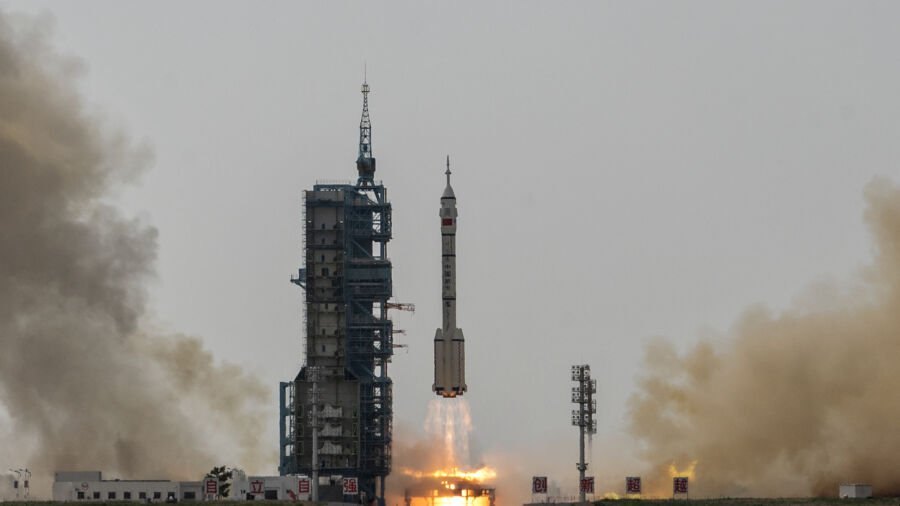Key U.S. officials warned Thursday that China’s expansion in space technology poses significant risks to national security and economic stability. The concerns were voiced during a congressional hearing held by the U.S.-China Economic and Security Review Commission (USCC).
During the hearing, which examined the strategic competition between the United States and China, speakers raised alarms about Beijing’s ambitions to achieve dominance in space.
“China is following its proven playbook. It is systematically building the manufacturing and R&D [Research and development] infrastructure to iterate rapidly and seize dominance in space,” said Mike Kuiken, a commissioner on the USCC. “China is pursuing a whole-of-nation approach to confront decades of American and European space innovation into just a few years, positioning it to leapfrog ahead.”
Kuiken highlighted that China’s rapid progress was partly due to aggressive tactics, including “illegal and gray zone tactics, cyber theft, deceptive joint ventures, forced technology transfers, talent recruitment programs, academic espionage, lawfare, hostile takeovers, and strategic acquisitions that ultimately relocate technology to Chinese soil.”
Drawing parallels to the Cold War’s Sputnik moment, Kuiken emphasized the urgency of the situation, noting that losing space dominance would have severe implications for U.S. military and economic strength.
“By 2030, China plans to land on the moon and return samples from Mars. By 2035, they aim to establish an operational lunar research station; by 2040, China plans to expand its lunar base and explore beyond Mars and Jupiter,” Kuiken added.
General B. Chance Saltzman, Chief of Space Operations for the U.S. Space Force, stressed that over half of America’s critical national infrastructure relies on satellite systems. He urged policy changes and increased investments to address the new reality that space is now a contested and congested environment.
“What war looks like is using weapons to deny an adversary access to those capabilities. So the PRC has built systems that can actually deny us the ability to use our satellites the way we want to,” Saltzman said.
Saltzman outlined six categories of space weapons, divided into ground-based and space-based systems.
“There’s directed energy, RF like jammers, and kinetic weapons. Kinetic weapons involve two objects running together to create a destructive force,” he explained. “The PRC is investing heavily in all six categories right now; we are not investing in all six categories.”
Victoria Samson, Chief Director of Space Security and Stability at the Secure World Foundation, noted China and Russia’s calls for a treaty to ban weapons in space, a proposal the United States has criticized as inadequate.
“China and Russia consistently cite the United States calling space a war domain as evidence that it is preparing for space war,” Samson said.
She noted that a significant number of developing nations tend to align with China and Russia on this matter. For example, Russia and China are steadily forming a coalition of nations aligned with their vision for space exploration, primarily through the International Lunar Research Station initiative. The project has drawn a group of partners worldwide, including Venezuela, South Africa, Egypt, Pakistan, and Kazakhstan. These countries have signed agreements to collaborate on lunar missions, share resources, and support ground infrastructure.
Despite similarities, Russia and China’s positions occasionally diverge, citing reports of Russia developing a nuclear orbital warhead, contravening international treaties, Samson added.
Dave Cavossa, President of the Commercial Space Federation, argued that today’s space competition differs fundamentally from the past, requiring sustained and broad human activity rather than targeting a single achievement.
“How are we doing in this race U.S. versus China? The U.S. is still the global leader in space today, but the People’s Republic of China is executing on their stated goal to catch up and overtake the U.S. by 2050,” Cavossa said. He criticized China’s disregard for “the environment, public safety, space sustainability, or intellectual property,” noting the absence of independent oversight in China’s space sector.
To address these threats, Saltzman emphasized improving U.S. ground infrastructure and cyber defenses.
“Without the ground infrastructure to support satellite satellites or just debris, they can’t do their missions. If we can’t talk to them, if we can’t pull the data down, if we can’t receive the usefulness and the advantages that they offer, it requires a ground network to do that. If you need any more evidence of that fact. Look at one of the first attacks the Russians made against Ukraine,” Saltzman said, stressing the need for enhanced collaboration with international allies and industry partners to counter China’s rapid developments effectively.

